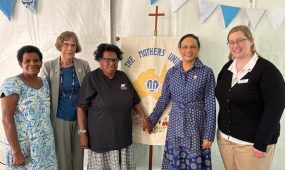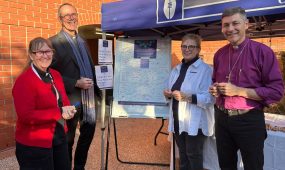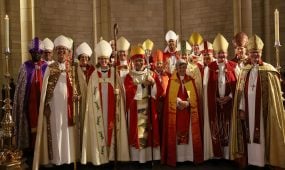Bishop John walking with inter-faith leaders impacted by conflict on fourth biblical-worthy Holy Week pilgrimage
Local
Bishop John Roundhill has embarked on his fourth biblical-worthy Holy Week pilgrimage, and is this year walking with diverse inter-faith leaders who have been impacted by conflict, covering over 170km across South East Queensland
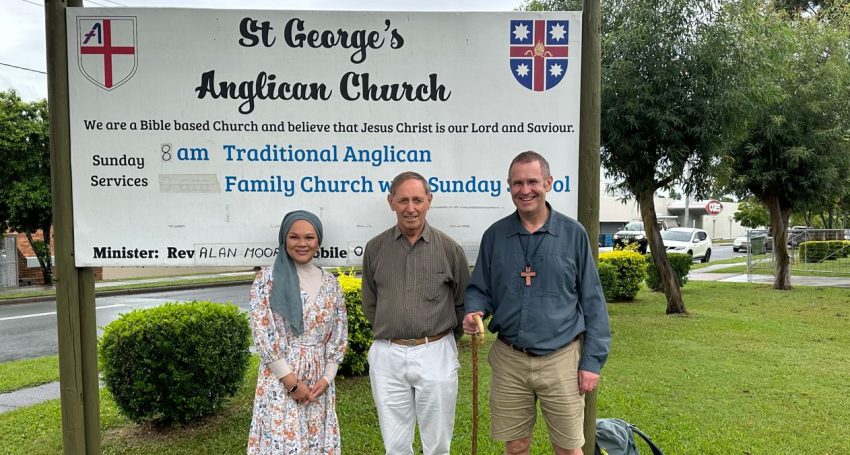
Bishop John Roundhill has embarked on his fourth biblical-worthy Holy Week pilgrimage, and is this year walking with diverse inter-faith leaders who have been impacted by conflict, covering over 170km across South East Queensland.
Bishop John’s fellow pilgrims include Ukrainian Catholic, Greek Orthodox Palestinian and Burmese Christian leaders, as well as Cham Muslim leader Nora Amath who is a former refugee born in Vietnam.
Bishop John said that he has especially reflected upon the plight of ordinary people impacted by invasions and wars since embarking on Saturday.
“One of the things I’ve pondered during this year’s Holy Week pilgrimage is that people of refugee background nearly always talk about walking as being a significant part of their journey seeking safety,” Bishop John said.
“Nora, at the tender age of three, fled on foot and walked a long way with her family through the jungles of Cambodia to Thailand following the Vietnam War, even facing the barrel of guns at times.
“Every year, I meet the most courageous people on my Holy Week pilgrimage, and this year I have been especially struck by how fragile and precious peace is.
“I hope more inter-faith and multi-cultural folk reach out to me while I am walking, so they can join me before I complete the pilgrimage on Saturday evening.”
The Christian season of Lent, which precedes the celebration of Easter, and the Muslim season of Ramadan, which precedes the celebration of Eid al-Fitr, happen to overlap this year.
Bishop John and Dr Amath, who will be walking together the day before Easter Day, said that they look forward to chatting about the commonalities between Lent and Ramadan.
Advertisement
“I believe that both Lent in Christianity and Ramadan in Islam share several theological and practical similarities, despite their distinct religious contexts,” Dr Amath said.
“These include fasting and renunciation, self-reflection and spiritual growth, charity and generosity, community fellowship and worship, repentance and seeking forgiveness and reconciliation.
“I’ve integrated ‘The Beatitudes’ from the Christian Bible into my approach to service, while a close Christian friend has embraced the Islamic invocation Bismillahir Rahma Nir Rahim — “In the name of God, the most Gracious, the Most Compassionate” — into his theological perspective.
“Having navigated the tumult of refugee life from such a young age, I have become determined to work with different communities in response to the suffering of others, irrespective of ethnicity, political affiliation, gender or religious belief.”
Bishop John said that his encounters with Muslims in both Australia and overseas have taught him much about the Christian imperative of “welcoming the stranger”.
“A focus on hospitality — the warm welcoming of guests — is something that the holy seasons of Lent and Ramadan share,” he said.
Advertisement
“When I was the Dean of Bendigo’s Anglican Cathedral between 2012 and 2018, I often went to iftars, where I joined in the breaking of the day’s fast with Muslim brothers and sisters and where I learnt so much about hospitality.
“My first experience of Ramadan was in Tunisia while holidaying as a young man with a friend in 1997.
“We didn’t know it was Ramadan and were puzzled during the day by all the closed restaurants.
“When we arrived in the city of El Kef after a very long journey, we walked into a restaurant, but because it was daylight and people were still fasting, we were not served when we arrived.
“As a sound echoed across the city to signal the end of the day’s fasting, the restaurant filled with locals ready to break their fast.
“Two men were sitting opposite us, and when their food was served to them, they pushed the plates in our direction even though they had not had anything to eat or drink for more than 12 hours.
“I tear up when I remember that gesture, knowing that this experience taught me what Lent is really about, and I still often tell that story when I preach.”
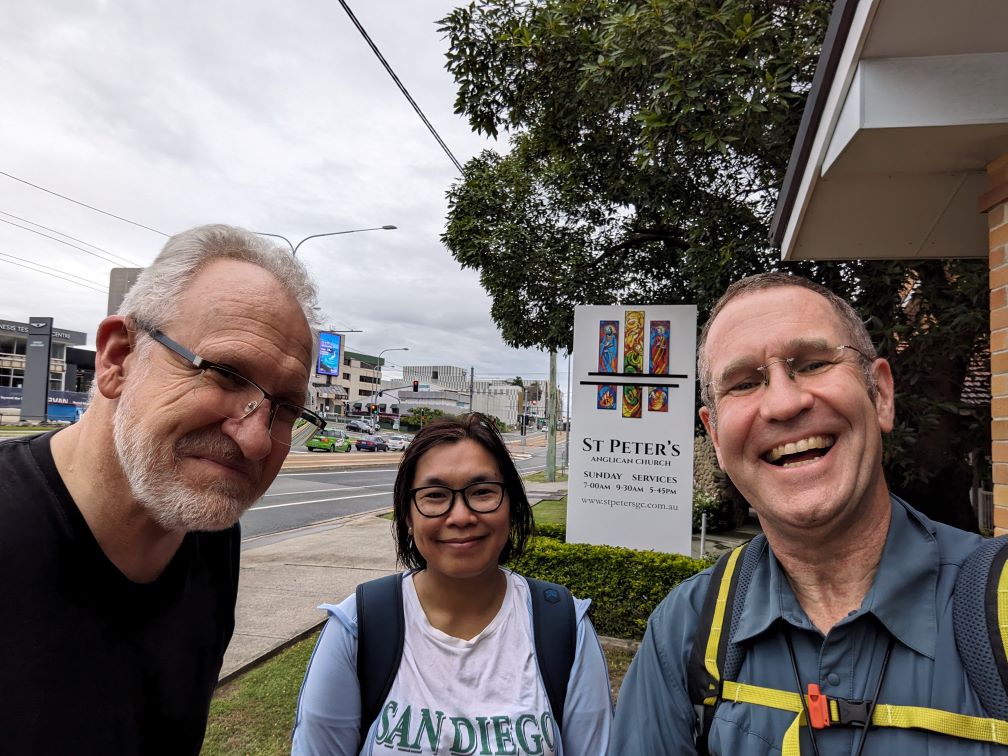
The Rev’d Dr Don Parker, law student and Burmese Anglican Sar Htoo and Bishop John Roundhill at St Peter’s Church in Southport on Saturday 23 March 2024 during Bishop John’s fourth Holy Week pilgrimage
Holy Week is the final week of the solemn 40-day Christian Lenten period, from Palm Sunday to Easter Day, and is commemorated by different denominations of Christians worldwide.
Bishop John explained that the 40 days of Lent represent the 40 days that Jesus spent in the desert fasting before he commenced his public ministry as a rabbi.
“During Holy Week I also think about the Jewish roots of my faith,” he said.
“This is especially true of Maundy Thursday, which commemorates Jesus sharing a Passover meal with the disciples — a meal that Christians call the ‘Last Supper’ because it was shared the day before Jesus’ death on a cross.
“The Passover holiday commemorates the liberation of Jews from slavery in Egypt.
“Jews traditionally eat bread on Passover and Jesus’ blessing of the bread at the Last Supper is where Christianity’s belief in the Eucharist, or Holy Communion, stems from.”
This is Bishop John’s fourth “Walking the Walk” Holy Week pilgrimage.
Bishop John said that walking with people on pilgrimage helps build community.
“Walking in groups allows for conversations to come and go at ease — because people chatting can always walk more slowly, community builds naturally,” he said.
“Great conversations come from shared activities and who knows what solutions, plans or ideas we inter-faith folk will come up with while we’re on the road together?”
The pilgrimage itinerary involves walking up to 25km daily; however, community members are welcome to join him for whatever distance they would like to travel.
The remaining days of this year’s pilgrimage will be spent walking across Redland Bay and Brisbane’s south.
Pilgrimages are an ancient Christian tradition, with early Church theologian and ascetic Origen of Alexandria one of the first to comprehend and communicate the concept of the Church as a “pilgrim people”.
The first Christian pilgrimages were made in early times to places connected with Jesus’ life, especially to the sites of his crucifixion.
Bishop John said that Holy Week is seen by Christians as an especially fitting period to take time out for this ancient spiritual practice.
“I find that I encounter God in a unique way when I am simultaneously engaged in physical activity and conversation, and I hope that this walk is transformative for me and all the community members who walk with me,” he said.
To find out more about Bishop John Roundhill’s planned route so you know where to be and at what time to join him (or to welcome him and fellow pilgrims in your suburb), you can read more about “Walking the Walk 2024” on his blog.



